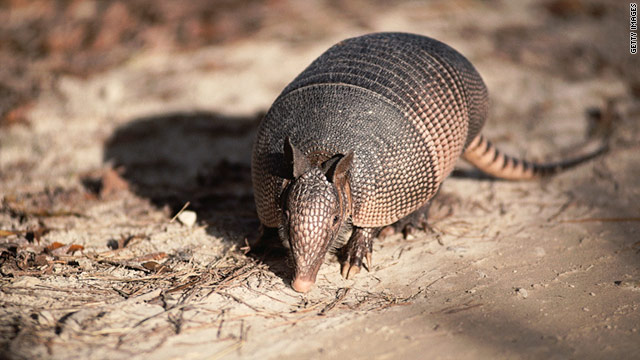TOP STORIES
Armadillos linked to leprosy in humans
 Several years ago, an 81-year-old woman with a raised patch of dry skin on her arm visited Mississippi dermatologist John Abide, M.D.
Several years ago, an 81-year-old woman with a raised patch of dry skin on her arm visited Mississippi dermatologist John Abide, M.D.Although the lesion looked only slightly abnormal, a series of lab tests revealed that it was a symptom of leprosy.
"I thought, 'Leprosy, are you kidding me?'" says Abide, whose practice is in Greenville. His surprise was understandable.
Each year only about 150 people in the U.S. are infected with leprosy, a bacterial disease that can lead to nerve damage and disfigurement. In most cases, people are infected after being exposed to saliva from an infected person, usually while traveling to parts of the world, such as Africa and Asia, where the disease is more prevalent.
CNN - www.cnn.com
28 Apr 2011
C Storrs
>>>FULL ARTICLE
Cited Journal Article
R Truman, et al. Probable Zoonotic Leprosy in the Southern United States. N Engl J Med 2011; 364:1626-1633; April 28, 2011.
28 Apr 2011
C Storrs
>>>FULL ARTICLE
Cited Journal Article
R Truman, et al. Probable Zoonotic Leprosy in the Southern United States. N Engl J Med 2011; 364:1626-1633; April 28, 2011.
Croc health holds warning signs for humans
 A visiting professor of gynaecology and obstetrics says the effects of water-borne contaminants on the reproductive health of alligators and saltwater crocodiles carry warning signs for humans.
A visiting professor of gynaecology and obstetrics says the effects of water-borne contaminants on the reproductive health of alligators and saltwater crocodiles carry warning signs for humans.Professor Louis Guillette from the Medical University of South Carolina in the US is one of the keynote speakers at an environmental toxicology conference in Darwin this week.
He has been studying the effects of pesticides and other chemicals on the ovaries of alligators in the Florida Everglades for the last two decades.
He says alligators and crocodiles are good indicators of the health of a waterway.
Send us your stories!
The news cycle has been slow recently with very little wildlife disease related news coming in. If you have seen something that we missed or found an article that you would like us to cover, let us know. Email your story suggestions to us at digest@wdin.org.
Photo courtesy of The Guardian - Week in Wildlife






